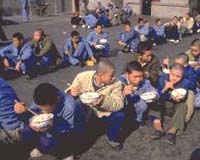 |
Washington (AFP) May 8, 2009 It was a summer day in 1999 when Rebiya Kadeer headed for an appointment with US congressional researchers, who had come to the city of Urumqi to probe the plight of China's Uighur minority. Fearful she was being tailed, Kadeer took a taxi. A large vehicle lunged toward them, but the cab driver quickly swerved, and it instead smashed into a car behind them, leaving a hand dangling lifelessly from the window. Paying no heed to the injured, black cars suddenly surrounded the taxi and officers alighted with automatic weapons. Thus began Kadeer's six years in prison, sometimes in a putrid 30 square-foot (2.5 square-meter) cell, where she says guards regularly beat and stripped naked the female prisoners. The events are described in Kadeer's memoir, "Dragon Fighter," just published in the United States, Britain and other English-speaking nations by Kales Press, an affiliate of W.W. Norton. In the book, she tells of a dramatic and diverse life from being a mother of 11 and a department store entrepreneur -- she says she was once the richest woman in all China -- to her transformation into the Uighurs' most prominent dissident and a contender for the Nobel Peace Prize. In the process she relates the story of the Uighurs, a Turkic and predominantly Muslim people who according to the latest US State Department report on human rights are facing severe cultural and religious repression. China abruptly freed Kadeer in 2005 ahead of a visit by then US secretary of state Condoleezza Rice. Now living in exile in the Washington area, Kadeer believes that Beijing regrets releasing her. "My hope is that everyone in the world will learn about our situation through this book," Kadeer told AFP from her guarded office near the White House. The slightly built 62-year-old, whose tiny workspace has two iMac computers, three megaphones and a framed photo of her meeting President George W. Bush, becomes animated when speaking of her homeland. "When I tell people of the suffering of our people, sometimes people in the West, because of the freedoms they take for granted, feel that this is just a fantasy," she said. "When five or 10 people get killed in a war zone, people immediately find out and voice deep sympathy," she said. "But with us it's very different -- China's totalitarian government has been systematically destroying the Uighur people for six decades, so the international community doesn't know our situation very well." Kadeer on May 21 will come full circle from her arrest for trying to meet congressional researchers -- she plans to open a general assembly of the World Uighur Congress from within the US Capitol complex. But in another eerie parallel, Kadeer in her book relates what she calls an assassination attempt in Washington in which a van slammed into her car; she said she and her assistant ran for their lives. Kadeer says Chinese agents have surveyed her home and tapped her telephone. Five of her children remain in the Uighur region of Xinjiang including two who are in prison, in what Kadeer says is a way to pressure her. Chinese authorities have described Kadeer as a "separatist monster" and accused of her of using Islamic "terrorism" to bring independence to Xinjiang. Kadeer dwells little on Islamic identity in her memoir, in which she tells Uighur folk fables. In one poignant episode, she relates switching from reciting the Koran in prison to offering a Uighur shamanistic prayer of pre-Islamic origin. She accuses China of using the September 11, 2001 attacks as a pretext to crack down on Uighurs. In prison, she said she was submitted to reeducation classes in which inmates were told not to believe in God and had to chant aloud 50 times, "We never want to separate from China!" "Dragon Fighter," written with the assistance of author Alexandra Cavelius, was originally published in German by Random House in 2007. The English version includes a forward from the most famous exile from Chinese rule, Tibet's spiritual leader the Dalai Lama. Kadeer voiced hope that the the book would eventually be translated into Chinese. She said a Chinese official made her pledge when she left that she would do nothing in exile to harm the Chinese people -- and she says she has kept her promise. "I am not fighting against the Chinese people," she wrote. "Rather -- just like many Chinese people themselves -- I am fighting for a democratically based government and for the unequivocal observance of human rights." Share This Article With Planet Earth
Related Links China News from SinoDaily.com
 15 suspicious deaths in China jails this year: state media
15 suspicious deaths in China jails this year: state mediaBeijing (AFP) April 19, 2009 Stricter monitoring measures are being introduced in all Chinese jails after at least 15 people died in unusual circumstances this year alone, state media reported Sunday. The Supreme People's Procuratorate said about half those detainees were beaten to death, blaming inadequate supervision of police and negligence by prosecutors, the Beijing Times reported. Of the 15 reported cases, sev ... read more |
|
| The content herein, unless otherwise known to be public domain, are Copyright 1995-2009 - SpaceDaily. AFP and UPI Wire Stories are copyright Agence France-Presse and United Press International. ESA Portal Reports are copyright European Space Agency. All NASA sourced material is public domain. Additional copyrights may apply in whole or part to other bona fide parties. Advertising does not imply endorsement,agreement or approval of any opinions, statements or information provided by SpaceDaily on any Web page published or hosted by SpaceDaily. Privacy Statement |